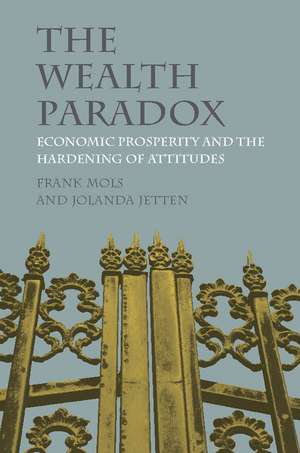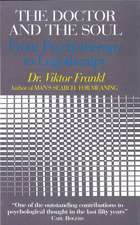The Wealth Paradox: Economic Prosperity and the Hardening of Attitudes
Autor Frank Mols, Jolanda Jettenen Limba Engleză Paperback – 8 mai 2017
| Toate formatele și edițiile | Preț | Express |
|---|---|---|
| Paperback (1) | 226.49 lei 39-44 zile | |
| Cambridge University Press – 8 mai 2017 | 226.49 lei 39-44 zile | |
| Hardback (1) | 383.92 lei 6-8 săpt. | |
| Cambridge University Press – 24 mai 2017 | 383.92 lei 6-8 săpt. |
Preț: 226.49 lei
Nou
Puncte Express: 340
Preț estimativ în valută:
43.34€ • 45.16$ • 35.88£
43.34€ • 45.16$ • 35.88£
Carte tipărită la comandă
Livrare economică 31 martie-05 aprilie
Preluare comenzi: 021 569.72.76
Specificații
ISBN-13: 9781107439139
ISBN-10: 1107439132
Pagini: 236
Ilustrații: 57 b/w illus. 2 maps 4 tables
Dimensiuni: 152 x 229 x 12 mm
Greutate: 0.39 kg
Editura: Cambridge University Press
Colecția Cambridge University Press
Locul publicării:New York, United States
ISBN-10: 1107439132
Pagini: 236
Ilustrații: 57 b/w illus. 2 maps 4 tables
Dimensiuni: 152 x 229 x 12 mm
Greutate: 0.39 kg
Editura: Cambridge University Press
Colecția Cambridge University Press
Locul publicării:New York, United States
Cuprins
Part I. What We Know (Or Think We Know): 1. Recognising the elephant; 2. Tracing the origins of 'harsh times' assumptions; 3. Empirical evidence for the 'harsh times producing hard attitudes' hypothesis; Part II. Broadening our Horizon: The 'Wealth Paradox': 4. Rethinking the relationship between wealth and tolerance: national, regional and local trends; 5. Development aid, charitable giving and economic prosperity; 6. The relative nature of wealth; Part III. Understanding the 'Wealth Paradox': 7. Towards an explanation of the wealth paradox: introducing social identity theorising; 8. The wealth paradox explained; 9. The missing link: crafty politicians galvanising latent sentiments; Final words.
Recenzii
'Mols and Jetten present a compelling case for the importance of the wealth paradox. This timely and fascinating book should serve as essential reading for all those interested in the continuing debate about economic conditions and hostilities towards minorities and newcomers.' Maykel Verkuyten, Universiteit Utrecht, The Netherlands
'A game-changer! Analyses of xenophobia typically focus on the anxieties of those at the bottom of the hierarchy. The authors carefully unsettle the academic and lay assumptions behind that focus and problematise the status concerns of the comparatively well-off. This is a provocative book of immense contemporary significance.' Nick Hopkins, University of Dundee
'The Wealth Paradox is a timely, clear and important corrective to the traditional social science assumption that only harsh times and contexts produce xenophobia and prejudice. Mols and Jetten integrate data and theory from history, social psychology, political science and psychology to craft an analysis of relative advantage that will change the way we think about the relationship between wealth and prejudice.' Heather Smith, Sonoma State University, California
'This book is an impressive deep dive into the motives of 'people from relatively well-to-do circles', uncovering their leadership role in the protests of the less privileged. The scientific analysis of how and why prosperity also affects intergroup relations calls for a collective responsibility for combatting increasing global inequality.' Inga Jasinskaja-Lahti, University of Helsinki, Finland
'… this book deserves an audience beyond academia: this is myth-busting at its most politically useful.' The Times Higher Education Supplement
'A game-changer! Analyses of xenophobia typically focus on the anxieties of those at the bottom of the hierarchy. The authors carefully unsettle the academic and lay assumptions behind that focus and problematise the status concerns of the comparatively well-off. This is a provocative book of immense contemporary significance.' Nick Hopkins, University of Dundee
'The Wealth Paradox is a timely, clear and important corrective to the traditional social science assumption that only harsh times and contexts produce xenophobia and prejudice. Mols and Jetten integrate data and theory from history, social psychology, political science and psychology to craft an analysis of relative advantage that will change the way we think about the relationship between wealth and prejudice.' Heather Smith, Sonoma State University, California
'This book is an impressive deep dive into the motives of 'people from relatively well-to-do circles', uncovering their leadership role in the protests of the less privileged. The scientific analysis of how and why prosperity also affects intergroup relations calls for a collective responsibility for combatting increasing global inequality.' Inga Jasinskaja-Lahti, University of Helsinki, Finland
'… this book deserves an audience beyond academia: this is myth-busting at its most politically useful.' The Times Higher Education Supplement
Notă biografică
Descriere
This book presents compelling evidence of the 'wealth paradox', where economic prosperity can also fuel prejudice, social unrest, and intergroup hostility.

















